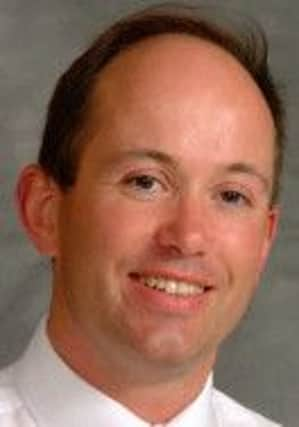Former St Mark’s parishioner to receive CBE


Buckingham Palace to receive his CBE from the Queen.
Professor Patrick Morrison, a consultant clinical geneticist at the Regional Genetics Service in Belfast City Hospital, was awarded the accolade for services to healthcare in Northern Ireland.
Married to Anne and father to Richard and Peter, Professor Morrison (50) holds honorary professorships in Human Genetics from Queen’s University and the University of Ulster.
Advertisement
Hide AdAdvertisement
Hide AdProfessor Morison grew up in the Ballymacash area, attending St Mark’s when he was younger; his parents still worship at the local church while he attends St John’s Parish, Malone.
He said he was surprised and honoured to receive the CBE. “I’m sure it is for all the work I’ve done for patients with difficult genetic disorders over the last 25 years here,” he said. “I introduced the concept of preventative surgery for patients with hereditary thyroid cancer based on DNA testing in 1990 in a family f rom Co Antrim, and set up our familial cancer service in 2000.”
Professor Morrison said in the early days people were reluctant to have preventative surgery because they felt it was too radical or too frightening, but things had changed.
“Since Angelina Jolie had her preventative surgery for hereditary breast cancer last year, we’ve been inundated with enquiries although already nearly 2,000 people have been tested for hereditary breast cancer genes in Northern Ireland over the last 12 years and several hundred carriers have had early diagnosis and preventative screening,” he said. “I also run clinics for patients with terrible neurological disorders including Huntington’s disease and different types of ataxia and muscular dystrophy.”
Advertisement
Hide AdAdvertisement
Hide AdThe professor said his research had helped patients greatly. “My CBE was a great honour but as I came into work on the morning after the news was published, my clinic in the Royal Maternity Hospital on Tuesday December 31 had eight ladies, all of whom received bad news about the pregnancies they were carrying. That, along with the three urgent ward referrals early that morning in the children’s hospital sorting out all sorts of problems quickly meant that my head was back to normal size within minutes of entering the hospital – the coalface of the NHS is a great humbler.”
He said his was a great job to do. “A large part of it is reassurance, when we can tell people they don’t have a particular gene. But if we find they do, we can take steps to prevent illness occurring. In some cases, there is no cure, but we can help people to prepare better for the future.